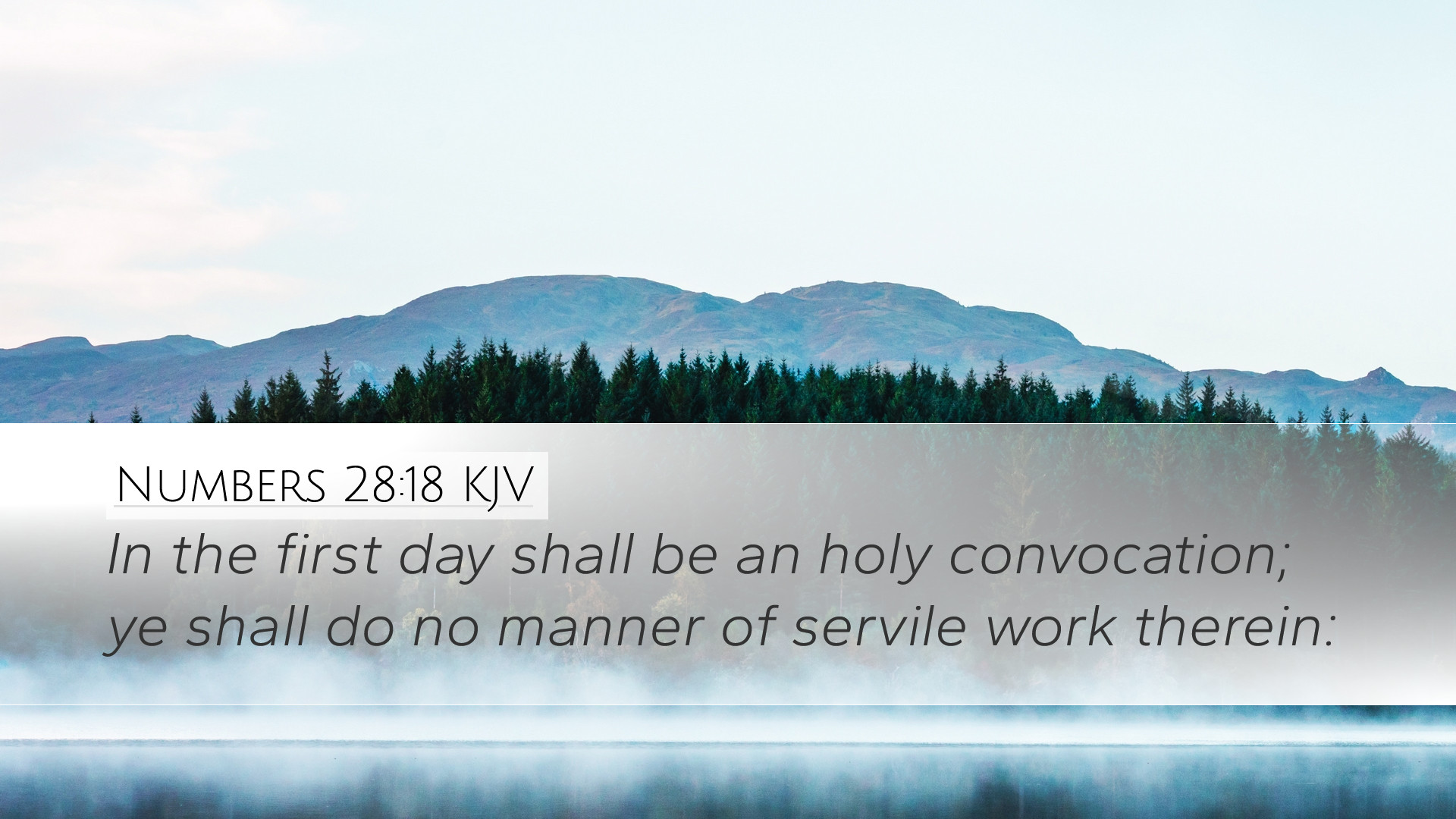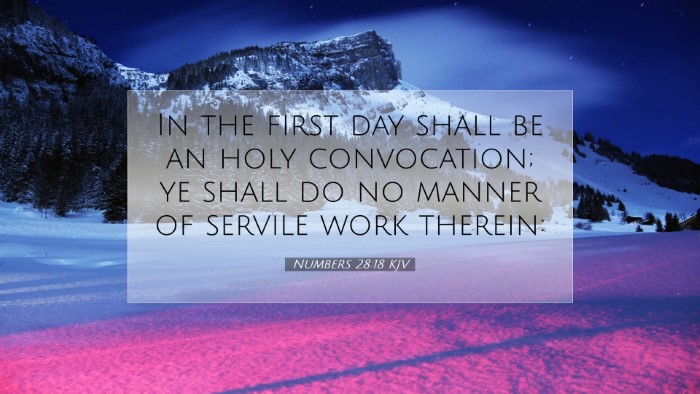Commentary on Numbers 28:18
Verse: Numbers 28:18
"On the first day there shall be a holy convocation: you shall do no customary work."
Introduction
In Numbers 28, God provides specific instructions regarding the offerings and sacrifices that are to be made by the Israelites. This chapter emphasizes the importance of the sanctity of worship and the need for regular, intentional devotion to God.
Contextual Background
The book of Numbers details the journey of the Israelites through the wilderness, their struggles, and the unique covenant relationship they have with God. Chapter 28 focuses primarily on the offerings and sacrifices that the people are to observe as part of their religious duties.
Overview of Public Domain Commentaries
Various respected commentators offer insights into this verse, shedding light on its theological significance, historical context, and practical applications.
Insights from Matthew Henry
Matthew Henry emphasizes the inaugural nature of the sacred days outlined in Numbers 28:18. He observes the importance of gathering for worship as “a holy convocation,” suggesting that it serves to elevate the spiritual atmosphere and cultivate a communal relationship with God.
Henry also notes that this observance involves refraining from “customary work,” which indicates a deliberate cessation from daily toil to honor God. This practice reflects the broader biblical principle that God desires His people to prioritize spiritual engagement over worldly concerns.
Insights from Albert Barnes
Albert Barnes elaborates on the significance of the “first day,” interpreting it as a day devoted entirely to the Lord. He explains that the phrase “holy convocation” indicates a formal gathering for religious purposes. Barnes highlights that this instruction points toward the celebration of sacred moments in the community of believers.
Furthermore, Barnes stresses the need for believers to maintain a day of rest and spiritual reflection, drawing parallels with the Sabbath observance, where the cessation from labor allows for contemplation of divine matters.
Insights from Adam Clarke
Adam Clarke discusses the historical context of holy convocations, which were assemblies specifically for worship and sacrifices. He highlights the cultural relevance of such gatherings in ancient Israel and the expectation God has for His people to maintain their spiritual responsibilities.
In his commentary, Clarke also underscores the significance of the phrase “no customary work.” He notes that this stipulation was crucial for the Israelites as it served to set apart the sacred from the secular and encourage mindfulness regarding their relationship with God on these holy days.
Theological Implications
Numbers 28:18 invites profound theological reflection on worship, community, and life priorities in a believer's journey. The text invites pastors and theologians to consider the implications of setting aside time for communal worship, which serves as a cornerstone for nurturing faith in a communal context.
Worship as a Priority
The emphasis on “holy convocation” underscores the need to prioritize collective worship within the life of the church or community. It serves as a reminder to both leaders and congregants about the necessity of gathering in the Lord’s name, taking time away from everyday life to engage fully with God.
Cessation from Work
Refraining from “customary work” is not merely about physical rest but also about spiritual rejuvenation. This corollary suggests that both physically and spiritually, worship requires an intentional distancing from life's distractions to fully engage in divine communion.
Application for Modern Believers
For pastors, students, and theologians, Numbers 28:18 serves as a profound reminder of the rhythms of grace that God instituted in ancient Israel, applicable even today.
Cultivating Sacred Rhythms
- Regular Worship: Develop a schedule that prioritizes communal worship and personal devotion.
- Mindful Rest: Create practices that promote rest from work and allow for spiritual reflection.
- Community Engagement: Encourage congregations to foster inclusive worship experiences that reflect holiness and community cohesion.
Conclusion
Numbers 28:18 highlights the fundamental importance of worship within the life of faith. As indicated by the insights from various public domain commentaries, both the communal aspect of worship and the intentional disengagement from everyday labor are vital for nurturing one's relationship with God. This verse serves as a timely exhortation for all believers to embrace the sacredness of time set apart for the Lord.


